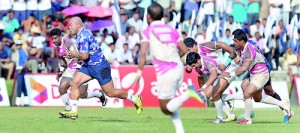It’s a matter of time says senior referee
View(s):The words Elvis sang “It’s a matter of time before I go back there, A matter of time before I go home” kept coming back as I heard the dissenting views of refereeing following the Clifford Cup Semi-final knock out match.
A veteran referee always said it was a “matter of time” whenever an expatriate referee was in the middle and in control.
Stressed on he explained that when a referee is seen on and off everybody will be happy. See him regularly and you will hear the same thing that our referees hear. This is all about the overall impression of a person that impacts the evaluation of that person. See him

It’s better to promote sportsmanship over gamesmanship - Pic courtesy SLRFU
often you always have something to say. So it was not strange to hear as well as read of criticism of the French Referee who handled five games in a space of ten days. I could not help but laugh when some of those knowledgeable people were saying our referees make the same mistakes. I was prompted to ask whether it means that there is a common thread which probably is different to what the offline bloggers saw.
But if you were to expect a silver lining and a solace for referees who will soon be seen again with schools tournament you are expecting too much. The intense and expectation was seen at the schools sevens as well as some junior matches played recently. The mini rugby sees lot of hysterics as the parents keep pushing the kids who are getting used to a game. When you hear the comments you wonder whether it really is a game. That is where you see gamesmanship in play. Gamesmanship is described as the dubious methods used to get a serious advantage to win in a sport. This really happens in junior games played in a divided pitch where supporters are allowed line up near the touch line. Stephen potter in is humorous book, The Theory and Practice of Gamesmanship (or the Art of Winning Games without Actually Cheating), narrates the following incident. Potter cites the origin of gamesmanship to be a tennis match in which he and the philosopher C.E.M. Joad competed against two younger and fitter men who were outplaying them fairly comfortably. On returning a serve, Joad hit the ball straight into the back-netting twelve feet behind the back-line. While the opponents were preparing for the next serve, Joad called across the net, in an even tone: “Kindly state clearly, please, whether the ball was in or out”. Being young, polite university students, their opponents offered to replay the point, but Joad declined. Because they were young and polite, the slight suggestion by Joad that their etiquette and sportsmanship were in question was extremely off-putting, and distracted them for the rest of contest. Potter and Joad went on to win the match.
In rugby and in Junior Games this type of thing happens as spectators are close to play and can make comments that can really put off a young school boy. Sometimes I wonder whether they are actually coached to do things like tagging a player and throwing a tag on floor thus putting your opponent off the game, etc.
These as we go on these traits develop to making use of the rules or that what is done will not be seen. The crafty knows that a referee will have a blind spot and make use of same. These then lead to more serious effort including foul play.
These problems have to be handled through a proper development matrix that requires those involved in guiding the youth being aware of how best to handle each stage and how to introduce sportsmanship as the foundation in which the game is built. That is where you have to distinguish between gamesmanship, which comes into play as you want to win, and sportsmanship which prepares a winner .
I particularly liked a comment made by a rugby league fan which read “I’ve always loved Rugby League – going to the games and supporting my favorite teams. But I don’t love it when fans get unruly or cause trouble on the sidelines. As a spectator, be sure to do the right thing. Enjoy the game and let the players know that win or lose, you support their efforts. As a parent, lead by example, promote good sportsmanship and be a positive role model for your children”.
What is important as we come closer to the schools season is to take responsibility to ensure that, through words and action you build the positive aspects while appreciating and maintaining the traditions, image and integrity of the game. It is always better to promote sportsmanship over gamesmanship. It is a matter of time.
Vimal Perera is a former Rugby Referee, coach and Accredited Referees Evaluator IRB



